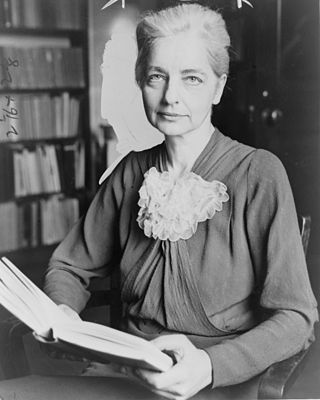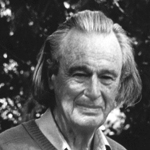Births
| | This section is empty. You can help by adding to it. (July 2010) |
| 1960s .1970s in anthropology. 1980s |
| Other topics: Comics . Fashion . Music . Science and technology . Sociology . Television . video games |
Timeline of anthropology, 1970–1979
1974
1977
1972
1974
1977
1979
| | This section is empty. You can help by adding to it. (July 2010) |
1972
1974
1977
1979
1979

Margaret Mead was an American cultural anthropologist who featured frequently as an author and speaker in the mass media during the 1960s and the 1970s.

Ruth Fulton Benedict was an American anthropologist and folklorist.
In anthropology, folkloristics, and the social and behavioral sciences, emic and etic refer to two kinds of field research done and viewpoints obtained.

Gregory Bateson was an English anthropologist, social scientist, linguist, visual anthropologist, semiotician, and cyberneticist whose work intersected that of many other fields. His writings include Steps to an Ecology of Mind (1972) and Mind and Nature (1979).
Marvin Harris was an American anthropologist. He was born in Brooklyn, New York City. A prolific writer, he was highly influential in the development of cultural materialism and environmental determinism. In his work, he combined Karl Marx's emphasis on the forces of production with Thomas Malthus's insights on the impact of demographic factors on other parts of the sociocultural system.
Timeline of anthropology, 1920–1929
Timeline of anthropology, 1980–1989
Timeline of anthropology, 2000–2009
This is a two-part chronological list of the works of anthropologist Marvin Harris. The first list contains his scholarly articles; the second contains his books.

Hannibal Lokumbe is an American jazz trumpeter.

John Derek Freeman was a New Zealand anthropologist known for his criticism of Margaret Mead's work on Samoan society, as described in her 1928 ethnography Coming of Age in Samoa. His attack "ignited controversy of a scale, visibility, and ferocity never before seen in anthropology."

Margaret Mead Award is an award in the field of anthropology presented (solely) by the Society for Applied Anthropology from 1979 to 1983 and jointly with the American Anthropological Association afterwards. This award was named after anthropologist Margaret Mead, who had a particular talent for bringing anthropology fully into the light of public attention. It is awarded annually but once became every-other-year from 1991 to 1999.
Robert Francis Murphy was an American anthropologist and professor of anthropology at Columbia University in New York City, from the early 1960s to 1990. His field work included studies of the Munduruku (Mundurucu) people of the Amazon and the Tuareg people of the Sahara.
Ray L. Birdwhistell was an American anthropologist who founded kinesics as a field of inquiry and research. Birdwhistell coined the term kinesics, meaning "facial expression, gestures, posture and gait, and visible arm and body movements". He estimated that "no more than 30 to 35 percent of the social meaning of a conversation or an interaction is carried by the words." Stated more broadly, he argued that "words are not the only containers of social knowledge." He proposed other technical terms, including kineme, and many others less frequently used today. Birdwhistell had at least as much impact on the study of language and social interaction generally as just nonverbal communication because he was interested in the study of communication more broadly than is often recognized. Birdwhistell understood body movements to be culturally patterned rather than universal. His students were required to read widely, sources not only in communication but also anthropology and linguistics. Collaborations with others, including initially Margaret Mead and Gregory Bateson, and later, Erving Goffman and Dell Hymes had huge influence on his work. For example, the book he is best known for, Kinesics and Context, "would not have appeared if it had not been envisaged by Erving Goffman" and he explicitly stated "the paramount and sustaining influence upon my work has been that of anthropological linguistics", a tradition most directly represented at the University of Pennsylvania by Hymes.
Cultural materialism is an anthropological research orientation first introduced by Marvin Harris in his 1968 book The Rise of Anthropological Theory, as a theoretical paradigm and research strategy. It is said to be the most enduring achievement of that work. Harris subsequently developed a full elaboration and defense of the paradigm in his 1979 book Cultural Materialism. To Harris social change is dependent of three factors: a society's infrastructure, structure, and superstructure.
Ethnoscience has been defined as an attempt "to reconstitute what serves as science for others, their practices of looking after themselves and their bodies, their botanical knowledge, but also their forms of classification, of making connections, etc.".
Lambros Comitas was Gardner Cowles Professor of Anthropology and Education at Teachers College, Columbia University. A product of Columbia University, he received the A.B. from Columbia College in 1948 after service in the United States Army, and was awarded the Ph.D. in anthropology in 1962 from the Columbia Faculty of Political Science. Influential figures in his early professional years were Conrad Arensberg, Marvin Harris, Charles Wagley and Margaret Mead from the Columbia faculty and M. G. Smith, the eminent British-trained anthropologist whom he first met during field work in Jamaica.
The Poet Laureate of Texas is the poet laureate for the U.S. state of Texas.
This bibliography of anthropology lists some notable publications in the field of anthropology, including its various subfields. It is not comprehensive and continues to be developed. It also includes a number of works that are not by anthropologists but are relevant to the field, such as literary theory, sociology, psychology, and philosophical anthropology.
Mary Margaret Clark (1925–2003) was an American medical anthropologist who is credited with founding the sub-discipline of medical anthropology.